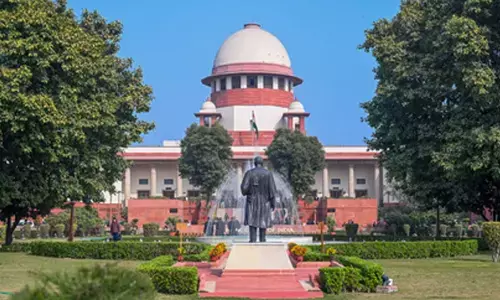Biomedical waste piling up at hospitals as authorities stand mute spectators

The waste generated by various hospitals across Mahabubnagar district is piling up heavily around the hospital premises
In fact, one can say the Pollution Control Board (TSPCB) authorities have miserably failed to take stock of dumping of hazardous wastes coming from the hospitals in the district.Take for instance the situation of the Government General Hospital in Mahabubnagar district, the hazardous waste such as used glouses, syringes, surgical waste generated during operations, half used and expired medicines etc are being piled up alongside the general garbage and it is causing great damage to the environment and it is also posing danger to the patients and general public visiting the hospitals.
In fact to collect and segregate the biomedical waste generated from the hospitals, special trained personals must be employed in the hospitals and as per the pollution control board regulatory norms the collected biomedical waste must be segregated at the source in Red, Orange and Green bins and must be disposed off accordingly.
However, the situation in the government and some of the private hospitals in Mahabubnagar district is completely different. The municipal authorities are forced to dispose of the same with the general garbage without undertaking proper treatment and this is causing a grave concern among the public as it can cause dangerous infections to the common public whoever comes in contact with such garbage.
According to Dr Agarwal, a member of Telangana State Medical Association from Mahabubnagar observed that, usually the biomedical waste generated by the hospitals, nursing homes and clinics must be collected by a separate agency appointed by the PCB and the same should be segregated and accordingly disposed of by way of either incineration, burning and deep burying in the underground after sterilizing with chemicals. "During Covid pandemic period, the biomedical waste generated by the hospitals was collected in a proper manner and was disposed off as per the PCB regulatory norms. But since more than one year, as the pandemic has now transformed into an endemic, the stress on disposing off the biomedical waste in a proper way has been overlooked," says Dr. Agarwal.
Usually biomedical waste consists of human anatomical waste, animal waste such as human tissues, organs, body parts, animal tissues, animals used in research, and animal waste parts collected from veterinary hospitals and animal houses. This kind of waste is incinerated and buried deeply in the ground.
The other hazardous wastes such as Microbiology and biomedical waste from laboratory culture, stocks of specimen of microorganisms, liver, or attenuated vaccines, toxins, dishes and devises used for transfer of cultures all such waste should also be incinerated. Other waste like needles, sharp blades, syringes, scalps, glass, etc should be auto calved and shredded. According to TSPCB data, there are over 60-70 registered hospitals, nursing homes and private clinics apart from the government primary healthcare centers in and around Mahabubnagar, which generate 300-600 kilograms of medical waste every day.
As per the Bio-Medical Waste (Management and Handling) Rules, 1998, the biomedical waste is classified into ten different categories, each with a specified method of disposal. In fact, it is mandatory for hospitals dealing with more than 1,000 patients a month to tie up with bio-medical waste disposal companies. Human anatomical waste such as body parts and tissue removed during surgery, and other potentially contagious objects generated as waste, should be incinerated at 1,100º celsius. Plastic, rubber and glass disposables like gloves, bottles, syringes, tubes and urine bags are supposed to be sterilized and shredded.
Dr Shekhar, who runs a private hospital, said that usually the biomedical waste collection in their hospital is collected in a systematic way and it is dumped as per the PCB regulatory norms. As many hospitals are still not adopting proper collection of biomedical waste in a systematic, way, they are violating the biomedical dumping norms and resorting to dump the hazardous waste alongside normal garbage, causing danger to the public and environment. It is high time that PCB authorities must crack their whip and bring the hospitals on to track so that the hazardous wastes do not cause health and environmental danger, observed experts.










